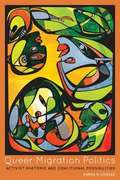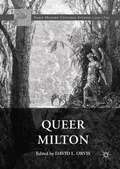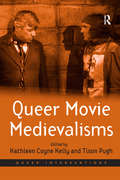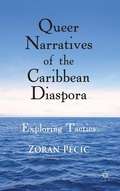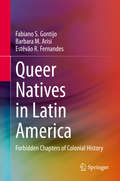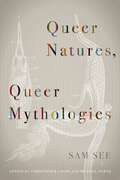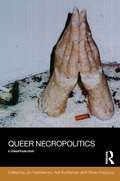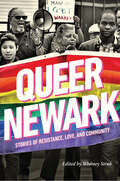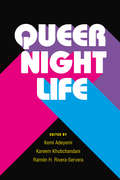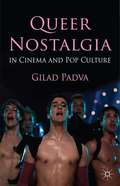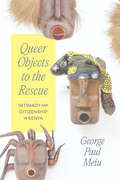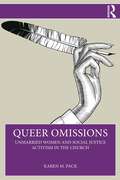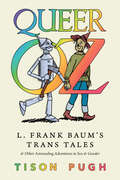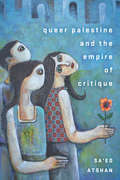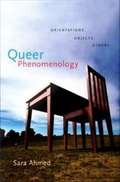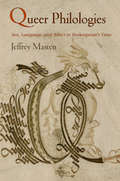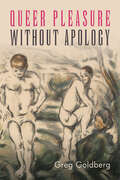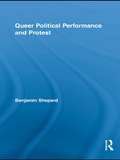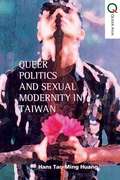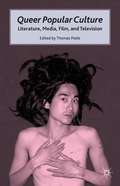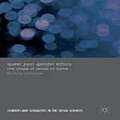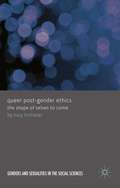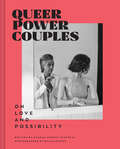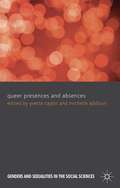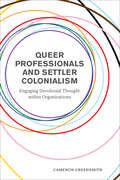- Table View
- List View
Queer Migration Politics: Activist Rhetoric and Coalitional Possibilities
by Karma R. ChavezDelineating an approach to activism at the intersection of queer rights, immigration rights, and social justice, Queer Migration Politics examines a series of "coalitional moments" in which contemporary activists discover and respond to the predominant rhetoric, imagery, and ideologies that signal a sense of national identity. Karma Chávez analyzes how activists use coalition to articulate the shared concerns of queer politics and migration politics, as both populations seek to imagine their ability to belong in various communities and spaces, their relationships to state and regional politics, and their relationships to other people whose lives might be very different from their own. Advocating a politics of the present and drawing from women of color and queer of color theory, this book contends that coalition enables a vital understanding of how queerness and immigration, citizenship and belonging, and inclusion and exclusion are linked. Queer Migration Politics offers activists, queer scholars, feminists, and immigration scholars productive tools for theorizing political efficacy.
Queer Milton (Early Modern Cultural Studies 1500–1700)
by David L. OrvisQueer Milton is the first book-length study dedicated to anti-heteronormative approaches to the poetry and prose of John Milton. Organized into sections on “Eroticism and Form” and “Temporality and Affect,” essays in this volume read Milton’s works through radical queer interpretive frameworks that have elsewhere animated and enriched Renaissance Studies. Leveraging insights from recent queer work and related fields, contributions demonstrate diverse possible futures for Queer Milton Studies. At the same time, Queer Milton bears witness to the capacity for queer to arbitrate debates that have shaped, and indeed continue to shape, developments in the field of Milton Studies.
Queer Movie Medievalisms (Queer Interventions)
by Tison PughHow is history even possible, since it involves recapturing a past already lost? It is through this urge to understand, feel and experience, that films based on medieval history are made. They attempt to re-create the past, but can only do so through a queer re-visioning that inevitably replicates modernity. In these mediations between past and present, history becomes misty, and so, too, do constructions of gender and sexuality leading to the impossibility of heterosexuality, or of any sexuality, predicated upon cinematic medievalism. Queer Movie Medievalisms is the first book of its kind to grapple with the ways in which mediations between past and present, as registered on the silver screen, queerly undercut assumptions about sexuality throughout time. It will be of great interest to scholars of Gender and Sexuality, Cultural and Media Studies, Film Studies and Medieval History.
Queer Narratives of the Caribbean Diaspora
by Zoran PecicThis book examines the concept of queer theory and combines it with the field of diaspora studies. By looking at the queer diasporic narratives in and from the Caribbean, it conducts an inquiry into the workings and underpinnings of both fields.
Queer Natives in Latin America: Forbidden Chapters of Colonial History
by Barbara M. Arisi Fabiano S. Gontijo Estêvão R. FernandesThis book defies long standing assumptions about indigenous societies in the Americas and shows that non-heteronormative sexualities were already present among native peoples in different regions of what is now Latin America before the arrival of European colonizers. Presenting data collected from both literature and field research, the authors give examples of native queer traditions in different cultural regions, such as Mesoamerica, the Amazon and the Andes, and analyze how colonization gradually imposed the models of sexuality and family organization considered as normal by the European settlers using methods such as forced labor, physical punishments and forced marriages.Building upon post-colonial and queer theories, Queer Natives in Latin America: Forbidden Chapters of Colonial History reveals a little known aspect of the colonization of the Americas: how a bureaucratic-administrative, political and psychological apparatus was created and developed to normalize indigenous sexuality, shaping them to the colonial order.
Queer Natures, Queer Mythologies
by Sam SeeQueer Natures, Queer Mythologies collects in two parts the scholarly work—both published and unpublished—that Sam See had completed as of his death in 2013.In Part I, in a thorough reading of Darwin, See argues that nature is constantly and aimlessly variable, and that nature itself might be considered queer. In Part II, See proposes that, understood as queer in this way, nature might be made the foundational myth for the building of queer communities.With essays by Scott Herring, Heather Love, and Wendy Moffat.
Queer Necropolitics: Queer Necropolitics (Social Justice)
by Adi Kuntsman Jin Haritaworn Silvia PosoccoThis book comes at a time when the intrinsic and self-evident value of queer rights and protections, from gay marriage to hate crimes, is increasingly put in question. It assembles writings that explore the new queer vitalities within their wider context of structural violence and neglect. Moving between diverse geopolitical contexts – the US and the UK, Guatemala and Palestine, the Philippines, Iran and Israel – the chapters in this volume interrogate claims to queerness in the face(s) of death, both spectacular and everyday. Queer Necropolitics mobilises the concept of ‘necropolitics’ in order to illuminate everyday death worlds, from more expected sites such as war, torture or imperial invasion to the mundane and normalised violence of racism and gender normativity, the market, and the prison-industrial complex. Contributors here interrogate the distinction between valuable and pathological lives by attending to the symbiotic co-constitution of queer subjects folded into life, and queerly abjected racialised populations marked for death. Drawing on diverse yet complementary methodologies, including textual and visual analysis, ethnography and historiography, the authors argue that the distinction between ‘war’ and ‘peace’ dissolves in the face of the banality of death in the zones of abandonment that regularly accompany contemporary democratic regimes. The book will appeal to activist scholars and students from various social sciences and humanities, particularly those across the fields of law, cultural and media studies, gender, sexuality and intersectionality studies, race, and conflict studies, as well as those studying nationalism, colonialism, prisons and war. It should be read by all those trying to make sense of the contradictions inherent in regimes of rights, citizenship and diversity.
Queer Newark: Stories of Resistance, Love, and Community
by Whitney Strub Peter Savastano Timothy Stewart-Winter Mary Rizzo Anna Lvovsky Yamil Avivi Jason Chernesky LeiLani Dowell Queer Newark Oral History Project Christina Strasburger Dominique Rocker Kristyn Scorsone Danielle M. Shields Carse RamosHistories of gay and lesbian urban life typically focus on major metropolitan areas like San Francisco and New York, opportunity-filled destinations for LGBTQ migrants from across the country. Yet there are many other queer communities in economically depressed cities with majority Black and Hispanic populations that receive far less attention. Though just a few miles from New York, Newark is one of these cities, and its queer histories have been neglected—until now. Queer Newark charts a history in which working-class people of color are the central actors and in which violence, poverty, and homophobia could never suppress joy, resistance, love, and desire. Drawing from rare archives that range from oral histories to vice squad reports, this collection’s authors uncover the sites and people of Newark’s queer past in bars, discos, ballrooms, and churches. Exploring the intersections of class, race, gender, and sexuality, they offer fresh perspectives on the HIV/AIDS epidemic, community relations with police, Latinx immigration, and gentrification, while considering how to best tell the rich and complex stories of queer urban life. Queer Newark reveals a new side of New Jersey’s largest city while rewriting the history of LGBTQ life in America.
Queer Nightlife (Triangulations: Lesbian/Gay/Queer Theater/Drama/Performance)
by Ramon Rivera-Servera Kareem Khubchandani Kemi AdeyemiThe mass shooting at a queer Latin Night in Orlando in July 2016 sparked a public conversation about access to pleasure and selfhood within conditions of colonization, violence, and negation. Queer Nightlife joins this conversation by centering queer and trans people of color who apprehend the risky medium of the night to explore, know, and stage their bodies, genders, and sexualities in the face of systemic and social negation. The book focuses on house parties, nightclubs, and bars that offer improvisatory conditions and possibilities for “stranger intimacies,” and that privilege music, dance, and sexual/gender expressions. Queer Nightlife extends the breadth of research on “everynight life” through twenty-five essays and interviews by leading scholars and artists. The book’s four sections move temporally from preparing for the night (how do DJs source their sounds, what does it take to travel there, who promotes nightlife, what do people wear?); to the socialities of nightclubs (how are social dance practices introduced and taught, how is the price for sex negotiated, what styles do people adopt to feel and present as desirable?); to the staging and spectacle of the night (how do drag artists confound and celebrate gender, how are spaces designed to create the sensation of spectacularity, whose bodies become a spectacle already?); and finally, how the night continues beyond the club and after sunrise (what kinds of intimacies and gestures remain, how do we go back to the club after Orlando?).
Queer Nostalgia in Cinema and Pop Culture
by Gilad PadvaQueer Nostalgia in Cinema and Pop Culture is a fascinating study of queer nostalgia in films, animation and music videos as means of empowerment, re-evaluating and recreating lost gay youth, coming to terms with one's sexual otherness and homoerotic desires, and creatively challenging homophobia, chauvinism, ageism and racism.
Queer Objects to the Rescue: Intimacy and Citizenship in Kenya
by George Paul MeiuExamines forms of intimate citizenship that have emerged in relation to growing anti-homosexual violence in Kenya. Campaigns calling on police and citizens to purge their countries of homosexuality have taken hold across the world. But the “homosexual threat” they claim to be addressing is not always easy to identify. To make that threat visible, leaders, media, and civil society groups have deployed certain objects as signifiers of queerness. In Kenya, for example, bead necklaces, plastics, and even diapers have come to represent the danger posed by homosexual behavior to an essentially “virile” construction of national masculinity. In Queer Objects tothe Rescue, George Paul Meiu explores objects that have played an important and surprising role in both state-led and popular attempts to rid Kenya of various imagined threats to intimate life. Meiu shows that their use in the political imaginary has been crucial to representing the homosexual body as a societal threat and as a target of outrage, violence, and exclusion, while also crystallizing anxieties over wider political and economic instability. To effectively understand and critique homophobia, Meiu suggests, we must take these objects seriously and recognize them as potential sources for new forms of citizenship, intimacy, resistance, and belonging.
Queer Omissions: Unmarried Women and Social Justice Activism in the Church
by Karen M. PackProtestant Christian historiography has persistently erased unmarried, childless women from the story of faith in Australia. When women are mentioned, they are judged according to a heteronormative, maternalist framework built upon the ideology of separate spheres. This paradigm creates a lopsided picture, whereby women are celebrated for their social and moral influence, but are absent from rational, intellectual discourse. This book asks the question, why have unmarried women who devoted themselves to social justice activism motivated by their Christian faith been erased from the pages of Australian religious histories? It does this through biographies of two unmarried women, each engaged in very different work aimed at creating a more just and equitable Australia.Queer Omissions uses biographical case studies of two unmarried, childless women, Frances Levvy (1831–1924) and Constance Duncan (1896–1970), to critique the writing of Protestant religious histories in Australia, asking why those outside a heteronormative framework have been relegated to the margins. Motivated by their faith, Duncan and Levvy engaged in social justice activism that left an indelible mark on Australian society. Yet, they remain absent from the histories of their own faith communities. Queer Omissions seeks to tell a bigger story, of women who chafed against their contracted sphere yet – motivated by their faith – impacted their world for good. In doing so, it uniquely expands the categories of those who see themselves in the story, finding hope in the process.This book will be of great interest to scholars of religion, gender, and sexuality, as well as people of faith trying to understand and reclaim their place in the story.
Queer Oz: L. Frank Baum's Trans Tales and Other Astounding Adventures in Sex and Gender (Children's Literature Association Series)
by Tison PughRegardless of his own sexual orientation, L. Frank Baum’s fictions revel in queer, trans, and other transgressive themes. Baum’s life in the late 1800s and early 1900s coincided with the rise of sexology in the Western world, as a cascade of studies heightened awareness of the complexity of human sexuality. His years of productivity also coincided with the rise of children’s literature as a unique field of artistic creation. Best known for his Oz series, Baum produced a staggering number of children’s and juvenile book series under male and female pseudonyms, including the Boy Fortune Hunters series, the Aunt Jane’s Nieces series, and the Mary Louise series, along with many miscellaneous tales for young readers. Baum envisioned his fantasy works as progressive fictions, aspiring to create in the Oz series “a modernized fairy tale, in which the wonderment and joy are retained and the heartaches and nightmares are left out.” In line with these progressive aspirations, his works are often sexually progressive as well, with surprisingly queer and trans touches that reject the standard fairy-tale narrative path toward love and marriage. From Ozma of Oz’s backstory as a boy named Tip to the genderless character Chick the Cherub, from the homosocial adventures of his Boy Fortune Hunters to the determined rejection of romance for Aunt Jane’s Nieces, Queer Oz: L. Frank Baum's Trans Tales and Other Astounding Adventures in Sex and Gender shows how Baum utilized the freedoms of children’s literature, in its carnivalesque celebration of a world turned upside-down, to reimagine the meanings of gender and sexuality in early twentieth-century America and to re-envision them for the future.
Queer Palestine and the Empire of Critique
by Sa'ed AtshanFrom Ramallah to New York, Tel Aviv to Porto Alegre, people around the world celebrate a formidable, transnational Palestinian LGBTQ social movement. Solidarity with Palestinians has become a salient domain of global queer politics. Yet LGBTQ Palestinians, even as they fight patriarchy and imperialism, are themselves subjected to an "empire of critique" from Israeli and Palestinian institutions, Western academics, journalists and filmmakers, and even fellow activists. Such global criticism has limited growth and led to an emphasis within the movement on anti-imperialism over the struggle against homophobia. With this book, Sa'ed Atshan asks how transnational progressive social movements can balance struggles for liberation along more than one axis. He explores critical junctures in the history of Palestinian LGBTQ activism, revealing the queer Palestinian spirit of agency, defiance, and creativity, in the face of daunting pressures and forces working to constrict it. Queer Palestine and the Empire of Critique explores the necessity of connecting the struggles for Palestinian freedom with the struggle against homophobia.
Queer Phenomenology: Orientations, Objects, Others
by Sara AhmedIn this groundbreaking work, Sara Ahmed demonstrates how queer studies can put phenomenology to productive use. Focusing on the "orientation" aspect of "sexual orientation" and the "orient" in "orientalism," Ahmed examines what it means for bodies to be situated in space and time. Bodies take shape as they move through the world directing themselves toward or away from objects and others. Being "orientated" means feeling at home, knowing where one stands, or having certain objects within reach. Orientations affect what is proximate to the body or what can be reached. A queer phenomenology, Ahmed contends, reveals how social relations are arranged spatially, how queerness disrupts and reorders these relations by not following the accepted paths, and how a politics of disorientation puts other objects within reach, those that might, at first glance, seem awry. Ahmed proposes that a queer phenomenology might investigate not only how the concept of orientation is informed by phenomenology but also the orientation of phenomenology itself. Thus she reflects on the significance of the objects that appear--and those that do not--as signs of orientation in classic phenomenological texts such as Husserl's Ideas. In developing a queer model of orientations, she combines readings of phenomenological texts--by Husserl, Heidegger, Merleau-Ponty, and Fanon--with insights drawn from queer studies, feminist theory, critical race theory, Marxism, and psychoanalysis. Queer Phenomenology points queer theory in bold new directions.
Queer Philologies: Sex, Language, and Affect in Shakespeare's Time
by Jeffrey MastenFor Jeffrey Masten, the history of sexuality and the history of language are intimately related. In Queer Philologies, he studies particular terms that illuminate the history of sexuality in Shakespeare's time and analyzes the methods we have used to study sex and gender in literary and cultural history. Building on the work of theorists and historians who have, following Foucault, investigated the importance of words like "homosexual," "sodomy," and "tribade" in a variety of cultures and historical periods, Masten argues that just as the history of sexuality requires the history of language, so too does philology, "the love of the word," require the analytical lens provided by the study of sexuality.Masten unpacks the etymology, circulation, transformation, and constitutive power of key words within the early modern discourse of sex and gender--terms such as "conversation" and "intercourse," "fundament" and "foundation," "friend" and "boy"--that described bodies, pleasures, emotions, sexual acts, even (to the extent possible in this period) sexual identities. Analyzing the continuities as well as differences between Shakespeare's language and our own, he offers up a queer lexicon in which the letter "Q" is perhaps the queerest character of all.
Queer Pleasure Without Apology (SUNY series in Queer Politics and Cultures)
by Greg GoldbergApproaches stigmatized sex with candor and curiosity, interweaving experience and analysis to better appreciate the intricacies and intrigue of queer desires and pleasures.Queer theorists have long defended stigmatized sexual desires and behaviors by demonstrating how they are either fundamentally harmless or have some higher political, psychological, or social value. While such defenses may be useful in combatting homophobia, the mandate that sex be either benign or virtuous has impeded our ability to apprehend the nuance and variety of the things that turn us on and get us off. Queer Pleasure Without Apology refuses this mandate, approaching stigmatized sex with curiosity rather than judgment. Greg Goldberg examines his own "bad" desires and behaviors-from anonymous sex to fetishization to playing games-to show how critics keep getting them wrong. Heady and humorous, Queer Pleasure Without Apology challenges us to think about sex in a way that is as playful and perplexing as sex itself.
Queer Political Performance and Protest (Routledge Advances in Sociology)
by Benjamin ShepardFrom the birth of the Gay Liberation through the rise of the AIDS Coalition to Unleash Power (ACT UP) in 1987, the global justice movement in 1994, the largest day of antiwar protest in world history in February 2003, the Republican National Convention protests in August 2004, and the massive immigrant rights rallies in the spring of 2006, the streets of cities around the world have been filled with a new theatrical model of protest. Elements of fun, creativity, pleasure, and play are cornerstones of this new approach toward protest and community building. No movement has had a larger influence on the emergence of play in social movement activity than the gay liberation and queer activism of the past thirty years. This book examines the role of play in gay liberation and queer activism, and the ways in which queer notions of play have influenced a broad range of social movements.
Queer Politics and Sexual Modernity in Taiwan
by Hans Tao-Ming HuangThis book analyses the critical reception of Pai Hsien-yung's Crystal Boys, one of Taiwan's first recognized gay novels and one which has played an important role in redefining sexual modernity and linking this to ongoing cultural dialogues on state-building. It examines the deployment of sexuality over the past five decades in Taiwan by paying particular attention to male homosexuality and prostitution. In addition to literary and film material, the study engages a number of relevant legal cases and media reports. Through Hans Huang's primary research and historical investigations, the book not only illuminates the construction of gendered sexual identities in Taiwanese culture but also, in a reflexive fashion, critiques the culture that produces them. Hans Tao-Ming Huangis assistant professor in the English Department, National Central University, Taiwan.
Queer Popular Culture: Literature, Media, Film, and Television
by Thomas PeeleThis collection addresses the politics of queer representation in multiple contexts. Articles cover the rise of the queer cowboy, the emergence of lesbian chic, and the expansion of representations of blackness alongside work on queer, Taiwanese, online communities; a transgender Israeli pop star; and film mimicry in Kerala, India.
Queer Post-Gender Ethics
by Lucy NicholasCan society operate without gender and even biological sex classifications? Queer Post-Gender Ethics argues that we could exist, formulate our relationships and be sexual in more androgynous ways. Outlining a political vision for how a post-gender sociality might be achieved, it presents queer social practices for a truly gender neutral world.
Queer Post-Gender Ethics: The Shape of Selves to Come (Genders and Sexualities in the Social Sciences)
by Lucy NicholasCan society operate without gender and even biological sex classifications? Queer Post-Gender Ethics argues that we could exist, formulate our relationships and be sexual in more androgynous ways. Outlining a political vision for how a post-gender sociality might be achieved, it presents queer social practices for a truly gender neutral world.
Queer Power Couples: On Love and Possibility
by Hannah Murphy WinterThis photographic celebration of queer love and excellence gathers fourteen LGBTQ+ power couples, offering a glimpse into the journeys that led to their meaningful relationships and thriving careers.From designer Debbie Millman’s ardent courtship of writer Roxane Gay to the romantic and creative relationship forged between Perfume Genius bandmates Mike Hadreas and Alan Wyffels on stage during their first world tour, this beautiful book offers a closer look into the lives of fourteen inspiring LGBTQ+ couples and the meet-cutes, success stories, and personal reflections that made them the role models they are today. These icons come from a range of backgrounds—they are trailblazers who lead research labs, kitchens, and news organizations; create life-giving art and music; and tell queer stories in award-winning books, films, and television shows.With in-depth original interviews by journalist Hannah Murphy Winter and intimate photography by their wife, Billie Winter, this diverse collection is a jubilant celebration of queer love and an empowering reminder to younger LGBTQ+ generations of their limitless possibilities.AMAZING PROFILES: This superlative collection features more than twenty-five queer leaders in film and TV, the music industry, journalism, academia, fine art, and nonprofits. Read about showrunner ND Stevenson and comic artist Molly Knox Ostertag, astrologer Chani Nicholas and nonprofit founder Sonya Passi, director Anthony Hemingway and actor Steven Norfleet, chefs Aisha Ibrahim and Samantha Beaird, and many more inspiring figures. BEAUTIFUL IMAGES: Intimate, joyful, and moving, the photography of Billie Winter captures a diverse group of queer icons in the worlds they have built for themselves. Her candid, organic images of the couples share intimate moments of laughter, conversation, and comfortable silence. And at the end of every photoshoot, she asked the couples to photograph each other — capturing the couples' love and connection with a vulnerability that only they could. This gorgeous book presents LGBTQ+ relationships in all their multiplicity.OWN VOICES: This is a book about queer power couples created by a queer couple. In-depth original interviews conducted by journalist Hannah Murphy Winter offer insightful context into the lives and careers of the LGBTQ+ changemakers, and photographs by her wife, Billie Winter, capture genuine, unscripted moments between the subjects. This is a meaningful gift for queer folks, allies who want to learn more about queer culture, and anyone who wants to uplift the stories of the LGBTQ+ community.Perfect for:Queer young people and adults and their loved onesAllies, advocates, and activistsFans of portrait anthologies and storytelling projects like Humans of New YorkFans of LGBTQ+ photography books like Loving: a Photographic History of Men In Love 1850s–1950s, We Are Everywhere, and Queer Love In ColorGift-giving for birthdays, weddings, anniversaries, Valentine’s Day, Pride Month, and other special occasions
Queer Presences and Absences
by Michelle Addison Yvette TaylorThis book explores changes and continuations in lesbian, gay, bisexual, transgender and queer lives, identities and spatial practices in the 21st century from around the globe, using a range of methods to connect pasts, places and policies with contemporary times, linking individual and social presences (and absences) affectively and materially.
Queer Professionals and Settler Colonialism: Engaging Decolonial Thought within Organizations
by Cameron GreensmithQueer Professionals and Settler Colonialism works to dismantle the perception of an inclusive queer community by considering the ways white lesbian, gay, bisexual, trans, and queer (LGBTQ+) people participate in larger processes of white settler colonialism in Canada. Cameron Greensmith analyses Toronto-based queer service organizations, including health care, social service, and educational initiatives, whose missions and mandates attempt to serve and support all LGBTQ+ people. Considering the ways queer service organizations and their politics are tied to the nation state, Greensmith explores how, and under what conditions, non-Indigenous LGBTQ+ people participate in the sustainment of white settler colonial conditions that displace, erase, and inflict violence upon Indigenous people and people of colour. Critical of the ways queer organizations deal with race and Indigeneity, Queer Professionals and Settler Colonialism highlights the stories of non-Indigenous LGBTQ+ service providers, including volunteers, outreach workers, health care professionals, social workers, and administrators who are doing important work to help, care, and heal. Their stories offer a glimpse into how service providers imagine their work, their roles, and their responsibilities. In doing so, this book considers how queer organizations may better support Indigenous people and people of colour while also working to eliminate the legacy of racism and settler colonialism in Canada.
